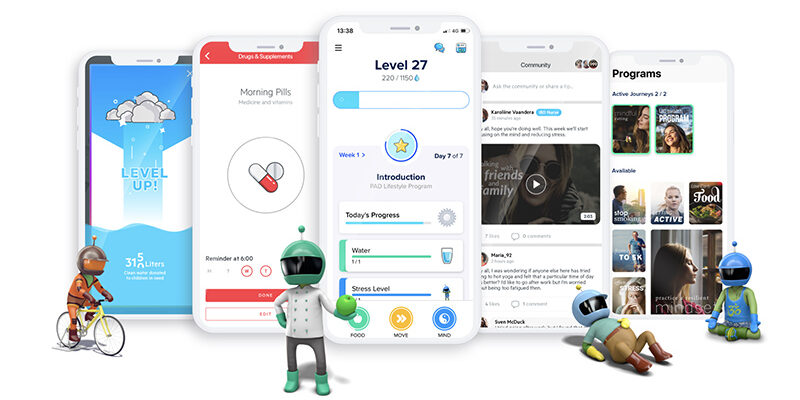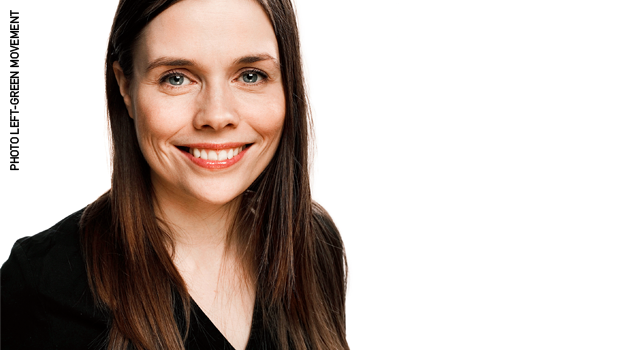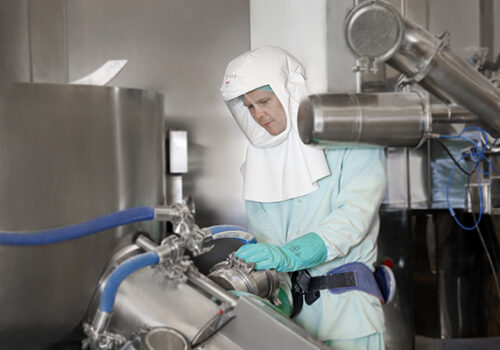Icelandic Sidekick aims to reduce healthcare strain and nudge people towards lasting lifestyle and behavior changes with its digital therapeutics innovations.
At the beginning of the pandemic, digital health company Sidekick Health teamed up with Iceland’s national emergency services and infectious disease experts and developed a nationwide COVID-19 program that allowed health professionals to monitor the condition of their patients through a mobile phone app. With their solution they helped take the pressure off overburdened hospitals and clinics.
“The solution was developed in weeks, not months or years, because of the pandemic.”
The app was based on the self-reporting of the patient on a panel of symptoms and measurements at multiple times throughout the day. Using artificial intelligence (AI) the platform categorizes cases by severity, which both saves time and enables health professionals to monitor and manage a large number of patients. “The solution was developed in weeks, not months or years, because of the pandemic,” says Gulli Arnason, Chief Marketing and Communications Officer (CMCO) at Sidekick Health.
“The pandemic has moved the digital health sector forward by a few years. We could clearly see an increased interest during our Series A fundraising efforts, and now we are witnessing a sharp rise in interesting conversations from possible partners and collaborators. This is especially true when it comes to providers of healthcare, who by need and nature are slow movers,” he says.
Integrating digital solutions
Before the pandemic came and changed the world, Sidekick’s platform had been proven in clinical studies to help manage weight control, medication adherence and psychological health. The two founders, medical doctors Tryggvi Thorgeirsson and Sam Oddsson, had worked for years treating patients with lifestyle-related illnesses and had started to explore the idea of using technology to prevent chronic illnesses and help people better manage their health.

Sam Oddsson and Tryggvi Thorgeirsson, the founders of Sidekick Health
“Research shows that 68% of all deaths can be linked to lifestyle-related illnesses, as well as about 80% of global healthcare costs. So, the size of the problem is enormous, and it will not be solved with the current bricks-and-mortar healthcare system,” says Arnason.
Arnason and his colleagues believe there is a void in the treatment of chronic disease, and that it will soon be unacceptable to leave the doctor’s office without digital care as part of the treatment. “Sidekick exists to fill this void,” he says.
Today, the company operates a digital care platform and provides 360-degree support to people with chronic illnesses. This includes remote monitoring, treatment adherence and disease specific education – driven by gamification. “Our solution is scalable across multiple therapeutic areas and applicable across the healthcare ecosystem. That means that we can work with pharmaceutical giants, as well as healthcare payers and providers,” says Arnason.
“I firmly believe that in the coming years no drug will be launched to market without a digital companion i.e., a digitally delivered clinical treatment that augments pharmacotherapy to boost health outcomes.”
The company has recently also made several important deals with pharma giants, including Pfizer and Bayer. “I firmly believe that in the coming years no drug will be launched to market without a digital companion i.e., a digitally delivered clinical treatment that augments pharmacotherapy to boost health outcomes. Patients access the treatment via a mobile phone application that is designed to address lifestyle factors and nudge people towards lasting behavior modification that increases the overall efficacy of combination treatment. As combination treatment, medicine agencies such as the FDA and EMA will then approve a treatment that consists of a drug and a digital therapeutic to be marketed and reimbursed by payers,” says Arnason.
The brand teams of pharmaceutical majors have been early explorers of digital therapeutics and digital health solutions, he adds. “But achieving positive health outcomes is increasingly playing an important role as an incentive for pharmaceutical firms to integrate digital solutions early into their offerings to meet the potential value-based reimbursement requirements of the future.”
Expanding outside Iceland
Being an Icelandic life science company means both opportunities and challenges, says Gulli Arnason. On the positive side for the company are access to exceptional talent across a variety of disciplines and a solid track record of punching above its weight. However, the size of the population brings its own challenges, he adds. In its current phase Sidekick has to hire people who hit the ground running, people who solve problems and do not create them, as well as adding talent that brings experience and skill sets that are missing from the organization.
“My main advice would be to realize that you don’t know everything and that it is extremely important to seek talent that fills in the knowledge gaps and expands your network and reach,” says Arnason.
The company today has around 60 employees, most of them in Reykjavik. However, the local talent pool is drying up and the logical step is to have a presence where they have access to a deeper pool of specialized top talent, says Arnason. “To put this into perspective, Barcelona’s Nou Camp Stadium can seat about 25% of the total population of Iceland.”
“Barcelona also featured highly on our list, but Berlin made more sense since most of our European collaborators are located in central Europe and anything we can do to reduce the time spent on planes, trains and automobiles is of high importance.”
The company has set up a presence in Berlin, for example, and are already building a team there. “Berlin is a very logical move for a digital health innovator like Sidekick, but Germany is taking the lead on advancing the wider adoption of digital therapeutics in Europe. The city also ranks second to London as the top startup location in Europe, especially in life sciences and digital transformation. Brexit has made a dent in London’s appeal, and the pandemic has highlighted that top talent is extremely mobile and is increasingly gravitating to places where quality of life is high. Barcelona also featured highly on our list, but Berlin made more sense since most of our European collaborators are located in central Europe and anything we can do to reduce the time spent on planes, trains and automobiles is of high importance,” says Arnason.
Minimize growing pains
When it comes to financing, Sidekick received early support from Iceland’s Technology Development Fund. “This was crucial in getting the company off the ground,” says Arnason. “The Icelandic startup scene is maturing, with the government putting entrepreneurship high on the agenda – including establishing a fund-of-funds to help facilitate growth,” he adds.
When Gulli joined the company, the product itself was already on the market and the business model was being born. The co-founders and the legacy team had created a stellar product. “The next phase on the journey was to raise our Series A and scale our business, which can be extremely tricky and there are certainly growing pains involved,” he says.
“Sidekick is growing fast, and anything that we can do to minimize growing pains, especially related to scaling up our teams on both sides of the Atlantic, is extremely important.”
The Series A fundraising was oversubscribed and the company raised USD 20 million. It was led by Asabys Partners and Wellington Partners, with participation from existing investors London-based Novator and Reykjavik-based Frumtak Ventures.
“Sidekick is growing fast, and anything that we can do to minimize growing pains, especially related to scaling up our teams on both sides of the Atlantic, is extremely important,” says Arnason.
The gap is narrowing
The pandemic has certainly cast the spotlight on digital health, as well as accelerating the wider adoption of digital health solutions across the healthcare landscape.

Gulli Arnason, CMCO, Sidekick Health
“This trend will continue to gather pace when we have managed to get the pandemic under control, but it has also slowed things down on other fronts, made it more difficult to set up our Berlin office, and complicated the rollout of our product in new markets. However, the silver lining is that in the long run COVID-19 will advance Sidekick’s mission of bringing healthcare into people’s homes.”
“But the gap is narrowing, and we are seeing US-based health and medical insurance giants emerge as partners.”
Patients are ahead of the curve, willing to adopt and use digital health solutions, while some other healthcare stakeholders are behind the curve he adds. “But the gap is narrowing, and we are seeing US-based health and medical insurance giants emerge as partners. We are also working on exciting projects with hospital operators in Europe.”





